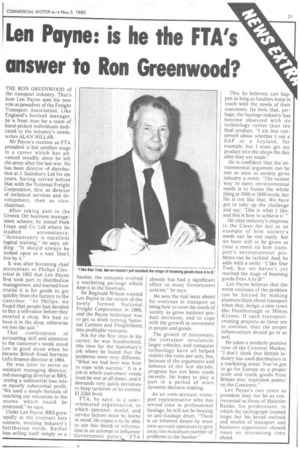Len Payne: is he the FTA's answer to Ron Greenwood?
Page 23

If you've noticed an error in this article please click here to report it so we can fix it.
THE RON GREENWOOD of the transport industry. That's how Len Payne sees his new role as president of the Freight Transport Association. Like England's football manager, he is front man for a team of hand-picked individuals dedicated to the industry's needs, writes ALAN MILLAR, Mr Payne's election as FTA president is but another stage in a career which has advanced steadily since he left the army after the last war. He has been director of distribution at J. Sainsbury Ltd for six years, having served before that with the National Freight Corporation, first as director of technical services and development, then as vicechairman.
After taking part in the Urwick Orr business management scheme, he joined Peek Frean and Co Ltd where he studied accountancy. "Accountancy is excellent logical training," he says, adding: "It should always be looked upon as a tool. Don't live by it."
It was after becoming chief accountant at Philips Electrical in 1952 that Len Payne first took part in distribution management, and learned how crucial it is for goods to get quickly from the factory to the customer. "At Philips, we foupd that people had decided to buy a television before they entered a shop. We had to have it in the shop, otherwise we lost the sale."
That combination of accounting skill and attention to the customer's needs stood Len in good stead when he became British Road Services Ltd's finance director in 1964.
He was later to serve as assistant managing director, and managing director at BRS, :urning a substantial loss into m equally substantial profit. 'We used a simple formula of natching our resources to the ncome which could be generated," he says.
Under Len Payne, BRS grew .apidly in the contract hire msiness, meeting industry's listribution needs. Rather han selling itself simply as a haulier, the company evolved a marketing package which kept it in the forefront.
Sir Reginald Wilson wanted Len Payne in the centre of the newly formed National Freight Corporation in 1969, and the Payne technique was to get to work turning National Carriers and Freightliners into profitable ventures.
Not for the first time in his career, he was headhunted, this time for the Sainsbury's job where he found that the problems were very different. "What we had here was how to cope with success." It is a job in which customers' needs must be met at all times, and it demands very quick decisions to keep turnover at its current £1.25bn level.
FTA, he says, is a userorientated organisation, in which operator, modal, and service factors must be borne in mind. He expects to be able to use this blend of information in an attempt to influence Government policy. ''FTA already has had a significant effect on many Government policies," he says.
He sees the real issue ahead for everyone in transport as being how to meet the needs of society as gross national product increases, and to cope with the growth in movement in people and goods.
The growth of motorways, the container revolution, larger vehicles, and computer technology have all helped restrict the costs per unit, but, because of the arguments and debates of the last decade, progress has not been made recently. He hopes to play a part in a period of more dynamic decision making.
As an own-account transport representative who has served time in professional haulage, he will not be beating an anti-haulage drum. "There is an inherent desire by most own-account operatots to give away the maximum number of problems to the haulier." This, he believes, can happen as long as hauliers keep in touch with the needs of their customers. He feels that, perhaps, the haulage industry has become obsessed with its technology rather than the final product. "I am less concerned about whether I use a DAF or a Leyland, for example,. but I must get my product into the shops the day after they are made."
He is confident that the environmental argument can be met as soon as society gives industry a remit. "The easiest way to meet environmental needs is to freeze the whole thing at 1950 or 1930 levels, but life is not like that. We have got to take up the challenge and say: 'This is what I like, and this is how to achieve it'."
He cites industry's response to the Clean Air Act as an example of how society's needs can be met easily, but we have still to be given as clear a remit on how transport's environmental problems can be tackled. And, he adds with a smile: "I like Star Trek, but we haven't yet reached the stage of beaming goods from A to B!"
Len Payne believes that the worst excesses of the problem can be limited by making planners think about transport when they design a new town like Peterborough or Milton Keynes. If such transportcreating projects as these are to continue, then the proper infrastructure should go in as well.
He takes a similarly positive view of the Common Market. "I don't think that British industry has used distribution in a marketing sense. You've got to go for Europe on a proper scale and trunk goods from Britain into 'explosion points' on the Continent."
Len Payne's two years as president may not be as controversial as those of Malcolm Banks, his predecessor, in which the tachograph loomed large; but his broad outlook and wealth of transport and business experience should mean an interesting time ahead.












































































































